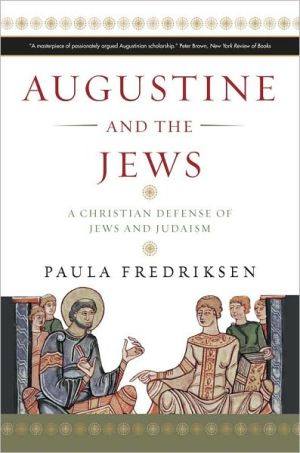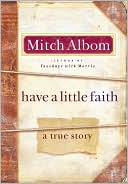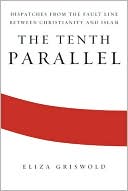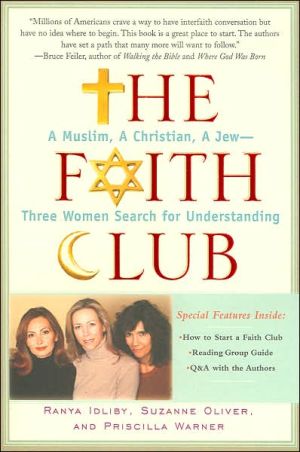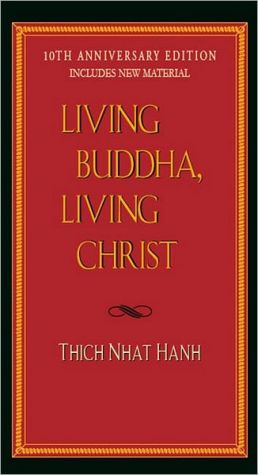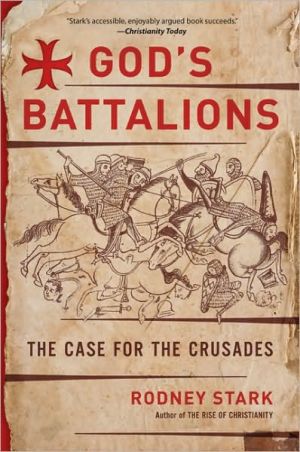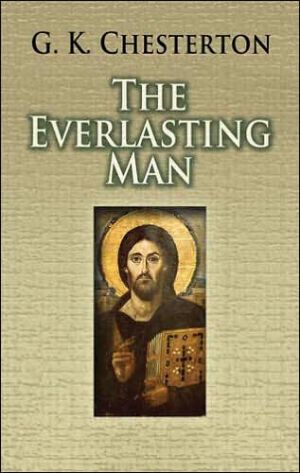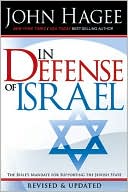Augustine and the Jews: A Christian Defense of Jews and Judaism
In Augustine and the Jews, Paula Fredriksen draws us into the life, times, and thought of Augustine of Hippo (396-430). Focusing on the period of astounding creativity that led to his new understanding of Paul and to his great classic, The Confessions, she shows how Augustine's struggle to read the Bible led him to a new theological vision, one that countered the anti-Judaism not only of his Manichaean opponents but also of his own church. Conceived as a vividly original way to defend...
Search in google:
In Augustine and the Jews, Fredriksen draws us into the life, times, and thought of Augustine of Hippo (396–430). Focusing on the period of astounding creativity that led to his new understanding of Paul and to his great classic, The Confessions, she shows how Augustine’s struggle to read the Bible led him to a new theological vision, one that countered the anti-Judaism not only of his Manichaean opponents but also of his own church. The Christian Empire, Augustine held, was right to ban paganism and to coerce heretics. But the source of ancient Jewish scripture and current Jewish practice, he argued, was the very same as that of the New Testament and of the church—namely, God himself. Accordingly, he urged, Jews were to be left alone. Conceived as a vividly original way to defend Christian ideas about Jesus and about the Old Testament, Augustine’s theological innovation survived the collapse of the Western Roman Empire, and it ultimately served to protect Jewish lives against the brutality of medieval crusades.Augustine and the Jews sheds new light on the origins of Christian anti-Semitism and, through Augustine, opens a path toward better understanding between two of the world’s great religions. Publishers Weekly In this densely argued and exhaustive book, religion professor Fredriksen (Jesus of Nazareth, King of the Jews) does for Augustine what she has already done so brilliantly for the historical Jesus. Drawing primarily on Augustine's Confessions and on his little-studied treatise, Against Faustus, she recreates the religious and political tensions of late fourth-century Christianity in North Africa and its attempts to understand its relationship to Judaism. While many early Christian writers condemned Jews as killers of Christ, Augustine turned the rhetorical tables on such polemic. As Fredriksen elegantly contends, Augustine argued that the Jews should be exempt from Christian persecution. Since the religious practices of the Jews devolved from God the Father-the same God Christians worshipped who was also the source of Jewish scriptures, tradition and practice-therefore God and the Jews, and thus the church and the Jews, maintain an abiding relationship. Contrary to many traditional interpretations, Fredriksen's deeply nuanced study demonstrates that the bishop of Hippo's later writings forcefully challenge the anti-Jewish tendencies of much of early Christianity and offer fresh ways of thinking about contemporary dialogue between the two religions. (Dec.)Copyright © Reed Business Information, a division of Reed Elsevier Inc. All rights reserved.
Pt. 1 The Legacy of Alexander1 Gods and Their Humans 32 Gods and the One God 163 Paideia: Pagan, Jewish, Christian 414 Pagans, Jews, and Christians in the Mediterranean City 79 Pt. 2 The Prodigal Son5 The Heretic 1056 The Sojourner 1227 The Convert 1558 The Biblical Theologian 190 Pt. 3 God and Israel9 The War of Words 21310 The Redemption of the Flesh 23511 The Mark of Cain 26012 "Slay Them Not ..." 290 Epilogue 353 Acknowledgments 367 Time Line 372 Chronology of Augustine's Life and Work 374 Notes 377 Primary Bibliography 429 Secondary Bibliography 435 Indexes 463
\ Booklist“A formidable work of cultural archaeology.”—Bryce Christensen, Booklist\ — Bryce Christensen\ \ \ \ \ \ New York Review of Books"It is a pleasure to write on a book that derives from a modern scholar's brain wave about the fateful insight of a thinker over a millennium and a half ago. . . . This is the story that Fredriksen tells with gusto. Her book is a masterpiece of passionately argued Augustinian scholarship."--Peter Brown, New York Review of Books\ — Peter Brown\ \ \ \ Religious Studies Review“The important story of Augustine and the Jews has never been told as well or as thoroughly. . . . This book is one of those rare works that is both accessible to the general educated reader and of value to experts.”—Paul R. Kolbet, Religious Studies Review\ — Paul R. Kolbet\ \ \ \ \ \ Bryn Mawr Classical Review“Marvelous . . . Even in the massive field of Augustinian studies, this work stands out . . . A triumph of scholarship on issues which are still debated today.”—Robert McEachnie, Bryn Mawr Classical Review\ — Robert McEachnie\ \ \ \ \ \ Publishers WeeklyIn this densely argued and exhaustive book, religion professor Fredriksen (Jesus of Nazareth, King of the Jews) does for Augustine what she has already done so brilliantly for the historical Jesus. Drawing primarily on Augustine's Confessions and on his little-studied treatise, Against Faustus, she recreates the religious and political tensions of late fourth-century Christianity in North Africa and its attempts to understand its relationship to Judaism. While many early Christian writers condemned Jews as killers of Christ, Augustine turned the rhetorical tables on such polemic. As Fredriksen elegantly contends, Augustine argued that the Jews should be exempt from Christian persecution. Since the religious practices of the Jews devolved from God the Father-the same God Christians worshipped who was also the source of Jewish scriptures, tradition and practice-therefore God and the Jews, and thus the church and the Jews, maintain an abiding relationship. Contrary to many traditional interpretations, Fredriksen's deeply nuanced study demonstrates that the bishop of Hippo's later writings forcefully challenge the anti-Jewish tendencies of much of early Christianity and offer fresh ways of thinking about contemporary dialogue between the two religions. (Dec.)\ Copyright © Reed Business Information, a division of Reed Elsevier Inc. All rights reserved.\ \ \ \ \ Library JournalA recognized scholar of the historical Jesus, Fredriksen (Aurelio Professor of Scripture, Boston Univ.; From Jesus to Christ ) explores Augustine of Hippo's journey into his own particular understanding of Scripture and of the place of Judaism in the Christian world. She particularly focuses on Augustine's commentaries on Paul's letters, the Psalms, and recorded disputations with the Manicheans whom he had once embraced. Over time, Augustine (354-430) arrived at his ideas of a just God and of human freedom, which in turn led to his teaching that Jews, divinely chosen, were necessary witnesses in the development of Christianity. The author draws especially on Augustine's Confessions and City of God and also references writings of contemporaries such as Ambrose and Jerome. She points out that despite the early development of anti-Judaism in the rhetoric of the day, the populations of urban Mediterranean cities intermingled socially, with Jews practicing their religious traditions, holding civil office, etc. Featuring textual analysis of a very high caliber and an extensive bibliography, this worthy contribution to the literature on Augustine is recommended for scholarly and religion collections.-Anna M. Donnelly, St. John's Univ. Lib., NY\ \ \
